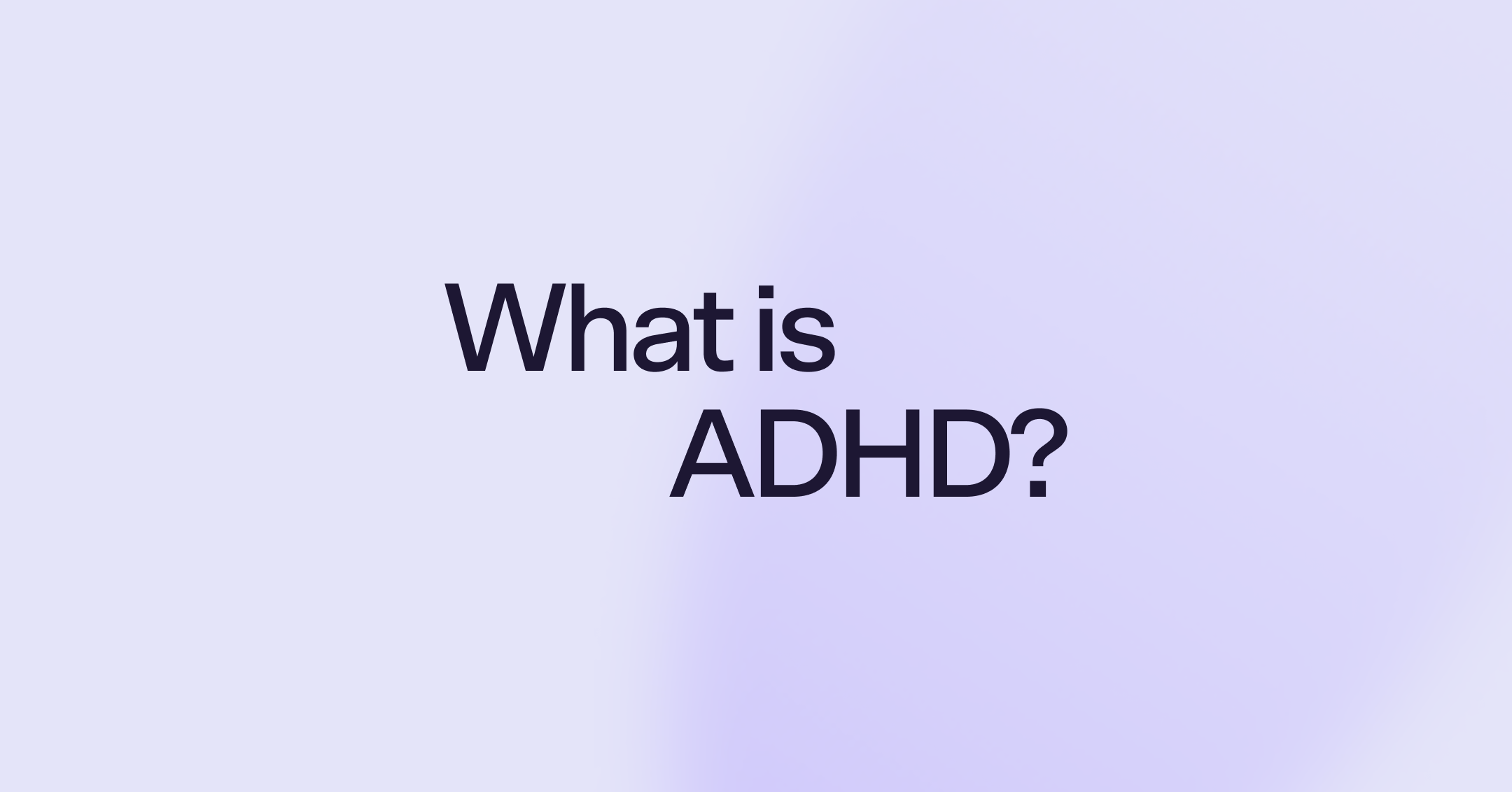Attention-deficit hyperactivity disorder (ADHD) is a mental health condition that can cause challenges with impulsivity, attentiveness, focus, and self-regulation. It’s typically diagnosed in childhood but can affect people of all ages.
There are three different types of ADHD that share some overlapping symptoms. These are hyperactive-impulsive, inattentive, and a combination of both.
Treatment for ADHD usually involves a combination of therapy and medication. Support from parents, teachers, and other caregivers is crucial in managing symptoms and improving outcomes.
ADHD (attention-deficit hyperactivity disorder) is a neurodevelopmental condition that healthcare providers often first identify in school-aged children. It’s one of the most common mental health conditions in the U.S., affecting over 8% of children and over 2% of adults.
ADHD is characterized by difficulties with focus, behavioral regulation, and impulsivity. For example, a child with ADHD may struggle to stay seated, wait their turn, or pay attention in school. This goes beyond typical childhood energy or occasional trouble meeting classroom expectations.
Left untreated, symptoms of ADHD can have significant personal, social, and academic effects that can continue into adulthood. Fortunately, there are effective treatments available to help people of all ages manage their ADHD symptoms.
The care you need, when you need it
Learn how Rula can support your mental health journey
Types of ADHD
All forms of ADHD share some common features. Most people with ADHD have difficulty paying attention and regulating their emotions or behavior in some way. However, there are three recognized types of ADHD:
Hyperactive-impulsive type ADHD: Mainly concerned with behavioral regulation, this form causes significant problems with hyperactivity and impulsivity.
Inattentive type ADHD: Formerly referred to as ADD, this type creates challenges with distractibility and paying attention.
Combined type ADHD: This presentation has both hyperactive and inattentive features.
If you think you might have ADHD but you’re not sure what type, that’s OK. Everyone’s experience of the condition is unique. There may be times when your symptoms fall more into the hyperactivity category and other times when you experience more inattentive symptoms. As we’ll discuss below, a mental health professional can provide an evaluation and diagnosis that will help shape your personalized treatment plan.
Symptoms and diagnosis of ADHD
Everyone has days when it feels harder than usual to pay attention to the task at hand. And you can probably recall a time when you acted impulsively, without thinking about the consequences of your behavior. But this doesn’t mean you have ADHD.
As you review the list of symptoms below, keep in mind that to be diagnosed with ADHD, a person must show an ongoing pattern of these behaviors. They also must significantly impact their life, relationships, or functioning.
ADHD symptoms in children
Being easily distracted
Having a short attention span
Always losing things
Making careless mistakes (often in their schoolwork)
Trouble remembering things
Difficulty paying attention to activities or topics that don’t interest them
Difficulty following instructions
Problems with organization
Trouble being physically still, especially in quiet environments
Always fidgeting or moving around
Trouble waiting one’s turn
Excessive talking or trouble being quiet
Interrupting others
Doing things impulsively without concern for safety or consequences
ADHD symptoms in adults
Lack of attention to detail that can look like carelessness
Trouble completing tasks or projects before starting a new one
Problems with organization
Trouble remembering things
Restlessness or irritability
Trouble with self-regulation (like speaking out of turn)
Frequent impatience
Mood swings
Limited distress tolerance
Impulsive or risky behavior
Dig deeper:
Causes of ADHD
Researchers are still working to uncover the underlying causes of ADHD. But it likely stems from a combination of the following factors:
Genetics: ADHD is a heritable condition, meaning it tends to run in families.
Environment: Exposure to environmental toxins like lead may increase the risk of ADHD.
Biology: Differences in brain structure and functionality may be partially responsible for ADHD.
Prenatal exposure: Exposure to substances, like alcohol or drugs, while in the womb may make a person more likely to have ADHD. Also, there’s some evidence to suggest that being born prematurely may increase your risk.
I wish more people understood that many people with ADHD often have to work twice as hard to manage daily tasks that others might find simple, highlighting the need for tailored support and understanding.

Brandy Chalmers, LPC
Clinical reviewer
Treatment of ADHD
If you or someone you care about is living with ADHD, know that there are effective ways to manage the condition. One of the first and most important steps in getting support for ADHD is seeking a professional evaluation.
During your first few meetings, your therapist or psychiatric provider will ask you a series of questions to get to know you and learn about your symptoms. They’ll use the information you share to ensure that you get an accurate diagnosis. Your provider will also assess you for other mental health conditions that frequently co-occur with ADHD.
Once your therapist has a clear understanding of your needs, strengths, and challenges, you’ll work together to create an ADHD treatment plan that’s right for you. This will likely include a combination of the:
Cognitive-behavioral therapy (CBT): CBT is a skill-based therapy that helps improve emotional regulation, executive function (organization and planning), stress management, and coping skills.
Medication: A variety of medications are available to treat ADHD. You can talk to your provider about whether this is the right option for you or your child.
Wraparound support: Treatment for children with ADHD is more effective when the adults in their lives are involved and on the same page. For example, there are teacher and parent training programs that can help adults manage challenging behaviors and reinforce desired behaviors in consistent, supportive ways.
Find care with Rula
Left untreated, ADHD can make it difficult for a person to thrive in school, at work, and in their relationships. It can also negatively affect self-esteem and emotional regulation. However, ADHD is also a form of neurodiversity. This means that, in addition to causing some differences, it can also lead to some strengths. So if you are living with ADHD, know that there are supports available to help you capitalize on your gifts and overcome your challenges.
When you need support for your mental health, Rula’s extensive network of therapists is just a few clicks away. To take the first step and find the right provider for your needs, check out our therapist-matching program. There, you can select an in-network provider who offers the specialized care you deserve, no matter the mental health issue you’re facing. And with Rula, you won’t face frustratingly long wait times for an appointment. Once you select a provider, you can schedule your first appointment as soon as tomorrow and begin receiving care right away.
Rula's editorial process
Rula's editorial team is on a mission to make science-backed mental health insights accessible and practical for every person seeking to better understand or improve mental wellness.
Members of Rula’s clinical leadership team and other expert providers contribute to all published content, offering guidance on themes and insights based on their firsthand experience in the field. Every piece of content is thoroughly reviewed by a clinician before publishing.




